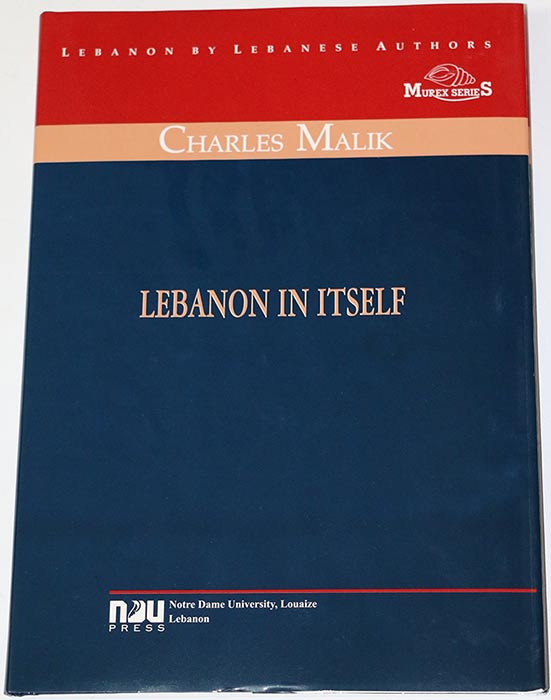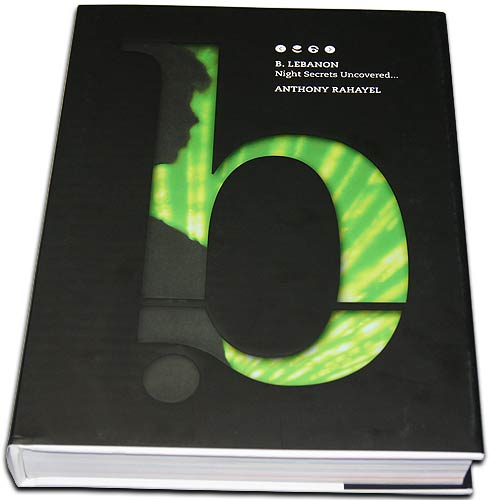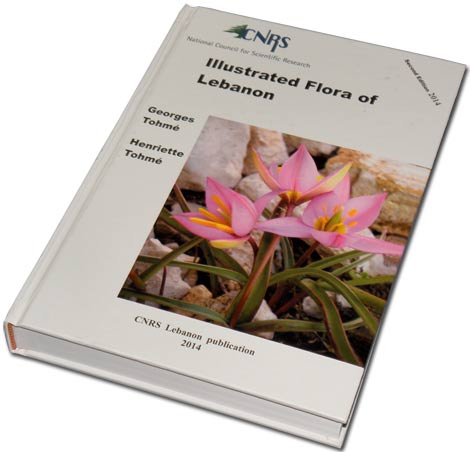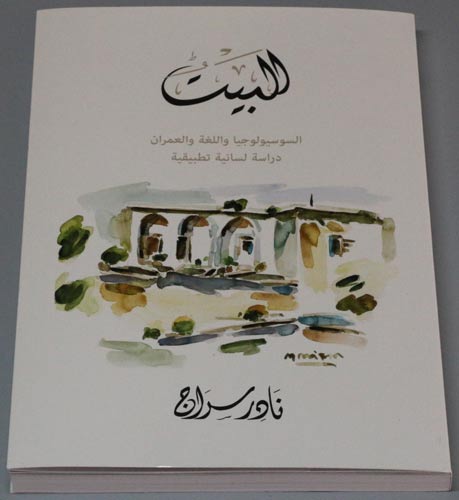The book Lebanon in Itself of Dr. Charles Malik, the author, was originally published in Arabic in 1973, by the general editor, Dr. Fouad Frem Al-Boustani. The translator, Dr. George Sabra was asked to kindly translate it into English…
Book: Lebanon in Itself
$14.20
Description
Notre Dame University has launched a new series, the Murex Series, under the headline Lebanon by Lebanese authors.
It is basically made up of selected works by great Lebanese authors ranging from literary to political to social and historical writings about Lebanon. The books are translated and published in an elegant cover that bears the slogan of the Murex connotatively and denotatively.
The aim of this series is to bring forth the civilizational aspect of Lebanon in its cultural, historical and social dimensions and to present it to the Western reader as a rich subject matter that enables him to understand the Lebanese presence on the international map.
This project was introduced in 2003 and is ongoing with the publication of an average of one or two books per year.
The book Lebanon in Itself of Dr. Charles Malik, the author, was originally published in Arabic in 1973, by the general editor, Dr. Fouad Frem Al-Boustani. The translator, Dr. George Sabra was asked to kindly translate it into English.
The book treated the subject of “Lebanon in its innermost being” which means “Lebanon in Itself”. The author considered Lebanon as a special identity, through its relations with both the Arab and the international worlds. He stressed that Lebanon is an existential and distinctive thing, and that its essence is the picture he drew in the book, from his own ideas.
Charles Malik treats thoroughly this special, existential and distinctive “thingness” of Lebanon. The author clearly states that his study is neither a historical, nor a poetic, nor an imaginary, nor a political study. Fundamentally it is a philosophical, humanist and existential outlook that penetrates to the ultimate truth of Lebanon.
Introduction:
This book treats the subject of ” Lebanon in its innermost being”, I mean Lebanon in itself. The treatment is existential, not political. Every political treatment, if it does not want to flounder, must stand on the existential ground. The form of Lebanon in itself, in its existence, origin and destiny, must be firmly rooted in the mind before considering any other subject. If you begin by considering that Lebanon is not a special thing in itself, you will have determined a priori its relation, e.g., to Syria, to Palestine, to the Arab world and to international currents. Lebanon would, then, not be a special thing in itself that is not another thing. If you begin by considering it a special thing in itself, then its relation to another thing, be it Arab or international, depends on the specific “thingness” which you conceive for it. Although you would thus be acknowledging the existence of the other thing, and that Lebanon is not another, its relation to those other things derives from the essence which you attribute to it. You might regard it as a dependent coast, or as merely a station for the transport of goods, ideas and means of communication, or as a strange sectarian construct, or an artificial creation. Whatever be your view of it, Lebanon’s relation to the world at large certainly depends on the nature of this view.
Lebanon in itself and its innermost being is my topic in this book. This is the special, existential and distinctive “thingness” which I represent for it. To the fundamental question, what is Lebanon? My answer is that Lebanon’s essence is precisely this picture that I have drawn.
It is perfectly clear that this study is not complete. After ascertaining the essence and “thingness” of Lebanon in itself, one must consider carefully and responsibly its relation to the Middle-East, the world and the tumultuous currents that are descending upon it. Thus, there is a need for another book that complements this one and that treats of Lebanon in its cultural and political relations to the Arab World, Europe, America, Asia, the Soviet Union, and the great African Continent. This other complementary book must also carefully, profoundly, and fully responsibly, consider the intellectual currents, political and otherwise, which arise within it or which come to it from outside. These schools of thought include, among other things, Syrian nationalism, Arab nationalism, international Zionism, Marxism, international Communism, materialism, technologism, rejectionism, and engulfment by momentary pleasure and sensation. All of these should be examined thoroughly in a calm and objective spirit. Each should first be examined separately on the basis of first principles, then, second, each one in relation to that existential thing that is Lebanon, and which I have determined in principle in this book. In the matter of Lebanon’s relation to anything, I come to that thing from Lebanon; I do not come to Lebanon from that thing. And the Lebanon from which I come to another thing is this Lebanon that I have set forth in this book.
Charles Malik
Rabiya, Lebanon
November 1, 1973
Author: Dr. Charles Malik
Translated by: Dr. George Sabra
Revised by: Kenneth Mortimer
Edition: 2004
Language: English
Number of pages: 70
Additional information
| Weight | 0.5 kg |
|---|---|
| Dimensions | 1 × 1 × 1 cm |






